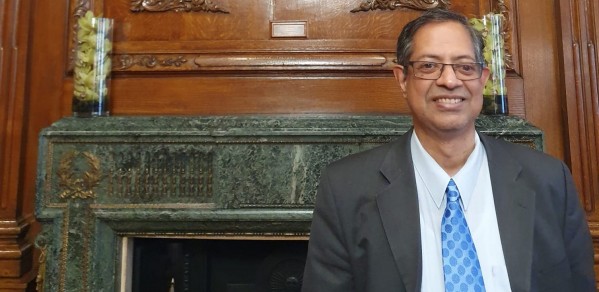
Professor Gopal Madabhushi, Director of the Schofield Centre and Head of the Geotechnical Group, has been elected to the Fellowship of the Institution of Civil Engineers.
Professor Madabhushi’s research focuses on earthquake risk mitigation of geotechnical and structural systems. His research has led to a better understanding of the response of these systems under extreme earthquake loading and soil liquefaction.
Professor Madabhushi’s research focuses on earthquake risk mitigation of geotechnical and structural systems. His research has led to a better understanding of the response of these systems under extreme earthquake loading and soil liquefaction. He has participated in many post-earthquake missions including the recent Turkey earthquake, to observe and understand the failures of structural and geotechnical systems.
His passion is to use the experimental and numerical modelling techniques to develop a fundamental understanding of the failure mechanisms in boundary value problems and insights into the material behaviour of granular soils that are vulnerable to liquefaction. He has published to date 3 books, 203 journal papers and 325 papers in international conferences and workshops.
His contributions to research in this field over a period of 35 years that were considered for his Fellowship election can be divided into the following four areas;
Innovative Research Equipment development:
- Development of novel earthquake actuators for use in the high gravity environment of a geotechnical centrifuge such as the Stored Angular Momentum (SAM) actuator and more recently the Servo-hydraulic earthquake actuator for realistic earthquake motion simulation. He also developed a simple, 1g shaking table for undergraduate teaching and research.
- Development of specialist model containers such as Equivalent Shear Beam (ESB) and laminar model containers.
- Development of appurtenant equipment such as computer-controlled sand pouring machine and automatic saturation (CAM-SAT) system.
Fundamental Research:
- Identification of pile buckling as a plausible failure mechanism in liquefied soils for single and pile groups.
- Importance of co-seismic drainage in liquefied soils that led to a paradigm shift in the routine use of cyclic triaxial testing to study liquefiable soils
- Identification of the role of time stepping in numerical analyses of liquefaction problems.
Field Investigations:
- Post-earthquake reconnaissance missions to Northridge (LA), 921 Chi-Chi Taiwan, Bhuj India, Haiti, New Zealand and most recently Turkey earthquakes.
- Observation of failures in the field and linking them to observations in the centrifuge tests
- Use of satellite imagery to estimate damage levels in earthquake affected areas.
Solving complex problems for Industry:
- Bridge pier foundations in liquefiable soils – Taiwan High Speed Railway
- Caisson foundations in soft clay – Subsea junction box structures in soft clay
- Seismic behaviour of offshore foundations – Monopiles and Jacket structures on pin-piles for application in Taiwan, Japan and South Korea.
Institution of Civil Engineers (ICE) Fellowships
ICE Fellows are successful and well-respected civil engineering professionals who have made a major contribution to the industry and are seen as role models for other engineers.
Pictured below are two of Professor Madabhushi's former students, who were presented with 2023 ICE awards. Professor Jonathan Knappett who was awarded the ICE Geotechnical Research Medal 2023 and Dr Barnali Ghosh who received the ICE John Mitchell Award 2023. Dr Ghosh, who is currently a Royal Academy of Engineering Visiting Professor here at the Department of Engineering, has made major contributions to the practical aspects of geotechnical engineering at both national and international levels. She will give the British Geotechnical Association John Mitchell Lecture in January 2024.


